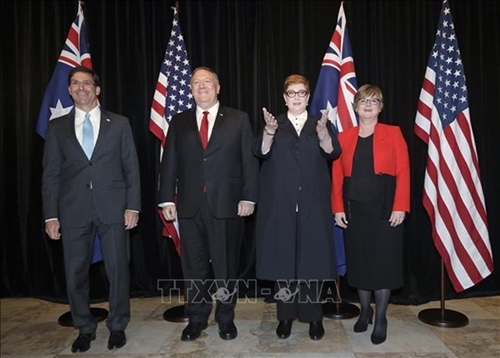According to Australia’s newspaper The Canberra Times, Australian Foreign Minister Marise Payne, US Secretary of State Mike Pompeo and Japanese Foreign Minister Taro Kono discussed the issue during their meeting in Bangkok last week.
They expressed serious concerns about negative developments in the East Sea, and voiced strong opposition to coercive unilateral actions that could alter the status quo and increase tensions such as land reclamation, construction of outposts, militarization of disputed features and other actions that cause permanent physical change to the marine environment in areas pending delimitation in the waters.
    |
 |
|
US Secretary of State Mike Pompeo (second from left) and Australian Foreign Minister Marise Payne (second from right) at the consultation on August 4 |
Meanwhile, on August 3, Reuters reported that US Defense Secretary Mark Esper held that China is destabilizing the Indo-Pacific, charging Beijing with predatory economics, intellectual property theft and “weaponizing the global commons.”
“We also stand firmly against a disturbing pattern of aggressive behavior, destabilizing behavior from China. This includes weapon sing the global commons, using predatory economics and debt for sovereignty deals, and promoting state-sponsored theft of other nations’ intellectual property,” he stated.
He declared that the US and its allies and partners will work to ensure security in the region amidst escalating threats.
Earlier, US State Department spokesman Morgan Ortagus said that the United States is concerned by reports of China’s interference with oil and gas activities in the East Sea, including Vietnam’s long-standing exploration and production activities.
China’s reclamation and militarization of disputed outposts in the East Sea, along with other efforts to assert its unlawful East Sea maritime claims, including the use of maritime militia to intimidate, coerce, and threaten other nations, undermine the peace and security of the region, he said.
At the same time, spokesperson of the India’s External Affairs Ministry Raveesh Kumar said at the weekly press conference: “We have genuine and legitimate interests in peace, stability and predictability of access to the major waterways in the region.” The East Sea is important as 55 percent of India’s trade passes through it, he added.
Source: VNA